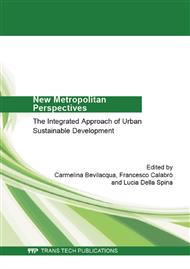p.276
p.282
p.291
p.297
p.303
p.314
p.323
p.330
p.338
Urban Regeneration and New Partnerships among Public Institutions, Local Entrepreneurs and Communities
Abstract:
The paper aims at investigating how different approaches in the interaction among public institutions, (local) entrepreneurs and communities lead to better perform effective urban regeneration processes. At this aim, purposely selected urban regeneration programs undertaken in some neighbourhoods of Boston are discussed against a conceptual frame drawn from the civic economics theory, trying to unveil the potential of innovative forms of multiple actors’ partnerships acting together to achieve urban regeneration goals. The paper demonstrates how both a conceptual shift of the role of private investors in partnerships for urban regeneration, capable to incorporate traditionally public- led goals into private duties, and a conceptual shift of public and private partnerships mechanisms, capable to incorporate not exclusively market-oriented values but also the value of reciprocity, can led to achieve: a) territorial concentration, obtained through place-based, community- based organisations enacting also central policies; b) continuity over time, obtained through the overlapping actions of multiple- stakeholders organisations covering different goals and areas that complement each other.
Info:
Periodical:
Pages:
303-313
DOI:
Citation:
Online since:
June 2014
Authors:
Keywords:
Permissions:
Share:
Citation:


